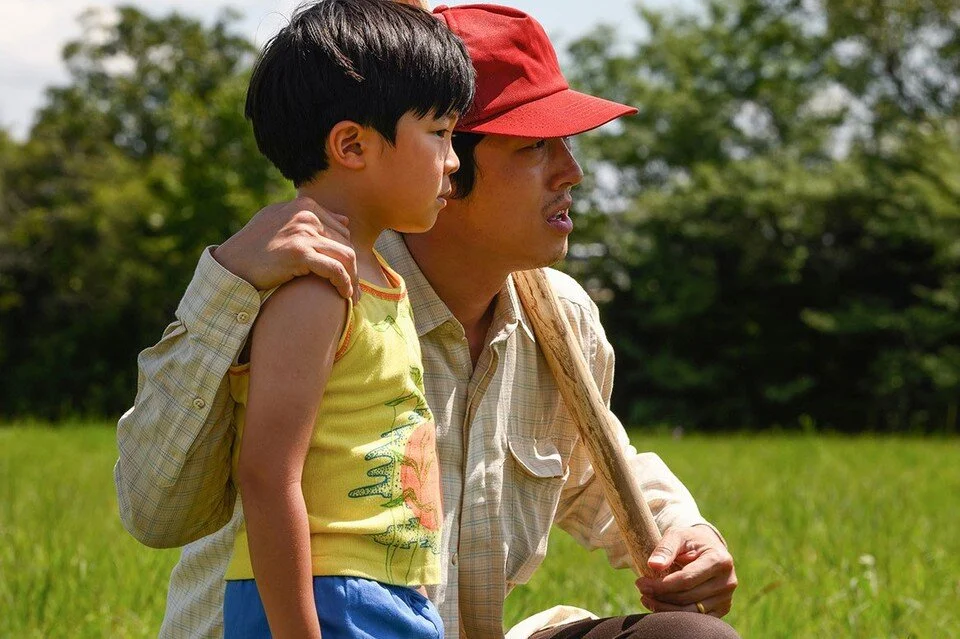‘Minari’ Finds Faith in Fertile, Arkansas Soil
Alan S. Kim and Steven Yeun in “Minari.” Photo courtesy of A24.
(REVIEW) Lee Isaac Chung’s “Minari” begins in the Garden of Eden — or, at least, the Arkansas equivalent of it. A Korean American family moves from California to a stretch of farmland in the Ozarks to start over: their own Genesis. The family’s time there is bookmarked by plagues that seem to have been sent directly from God, in the forms of flood and fire.
It’s only the beginning of the spirituality imbued in “Minari,” one of the most beautiful and poignant movies of the year.
The movie is already critically acclaimed. Its debut at Sundance in 2020 won the U.S. Dramatic Grand Jury Prize and the U.S. Dramatic Audience Award. It’s been nominated for Best Foreign Language Motion Picture at the 2021 Golden Globes — and many (including me) believe it was snubbed by being left out from the Best Motion Picture category.
Movies as beautiful as “Minari” are rare: this story offers a space for faithful reflection that Christian movies almost never provide.
The biggest turnoff of many modern, Christian movies is their cringeworthy un-subtlety: movies read more as evangelizing tracts than pieces of art. There’s another misconception in the subset of viewers who genuinely enjoy faith-based films that liberal Hollywood isn’t making movies for Christians, so they need overtly Christian media to show their families.
“Minari” proves, blessedly, that isn’t always true.
Jacob (Steven Yeun) and Monica (Yeri Han), who both work menial jobs in a small factory sorting male and female chickens, have a somewhat tense marriage. Monica had no desire to move away from their home and didn’t expect their new home to be so rundown; she asks her children with unmasked distaste whether they would want to live in a home like this when they’re married.
But Jacob’s greatest passion is this farmland, and he’s intent that they stay and cultivate the land to fruition.
It’s Terrence Malick’s “Days of Heaven” but more beautiful and meditative.
On top of their other troubles, the young son David has a hole in his heart that results in murmurs that they must monitor. Worried for his health, they tell him over and over again not to run — even though it seems like, at times, it’s the only thing he wants to do. Because of the condition, Monica’s boisterous mother Soonja moves in with the family early on to watch over him.
The family is Christian (though the faith is something Monica is more invested in than Jacob) and it’s evident in little details: above their couch, for example, hangs a painting of Jesus leading the flocks.
They attend church as a family one Sunday, but find themselves out of place among well-meaning but brassy Arkansans who promise to teach Monica English and ask David why his face is so flat.
The story is based off of director Chung’s personal experience of moving to Arkansas with his family. But he didn’t want this to be a biographical film. So the characters and story of “Minari” aren’t carbon copies of Chung’s experience, but the story is distinctly Korean American, from the cuisine to an offhand comment from another Korean in town about the pitfalls of the Korean church.
Tension in “Minari” ebbs and flows at a comfortable — if not pleasant — pace. The family struggles with startup costs, but they find their own water source and purchase a sturdy, used tractor. Monica gets consistently better and faster at chicken sorting; the children make a few church friends and grow content. Jacob eventually grows a flourishing harvest with the help of Paul, a devout neighbor who speaks in tongues and curses Jacob’s cigarettes in the name of Jesus. Soonja plants minari (water dropwort) by the creek in the forest behind the family home.
The main struggle, and the movie’s ultimate message, is in the family. David doesn’t believe Soonja is a “real grandma” because she’s not meek, and Soonja is constantly encouraging David to go beyond the carefully-constructed boundaries his parents set.
Consequently, the most beautiful transformation comes as David’s love for Soonja grows. He begins calling her “grandma,” and she soothes his fears while they lay together on a pallet bed in the room they share. And eventually, David runs with abandon — so he can follow her.
This slow burn in tension makes “Minari” the antithesis of many faith-based films. The movie’s point is not to evangelize or even prove that the family would be better off in achieving the American Dream if they subscribed to evangelical Christianity.
It’s rather a portrait painted with the utmost care of what it could be like for a Korean American family to move to rural Arkansas and start over. That contains a reverent portrait of American Christianity that’s embedded in the state’s soil, from the funny practices to the soul-binding devotion of some worshippers.
It captures with perfect clarity the inherent awkwardness of after-church potluck luncheons, especially as the new family in the flock. And it’s rife with unique, spiritual characters like Soonja, David and Paul, whose name proves to be fitting; he carries a wooden cross down the dirt road every Sunday morning as his form of worship.
And as the family is reminded through a variety of hardships that the things of the earth — even the farm and the family — are temporary, they become closer to each other and closer to the God in the soil. There’s no beauty greater than that realization.
“Minari” releases Feb. 12 in A24’s screening room. It is available to rent and buy on other streaming platforms beginning Feb. 26.
Jillian Cheney is a Poynter-Koch fellow for Religion Unplugged who loves consuming good culture and writing about it. She also reports on American Protestantism and evangelical Christianity. You can find her on Twitter @_jilliancheney.

